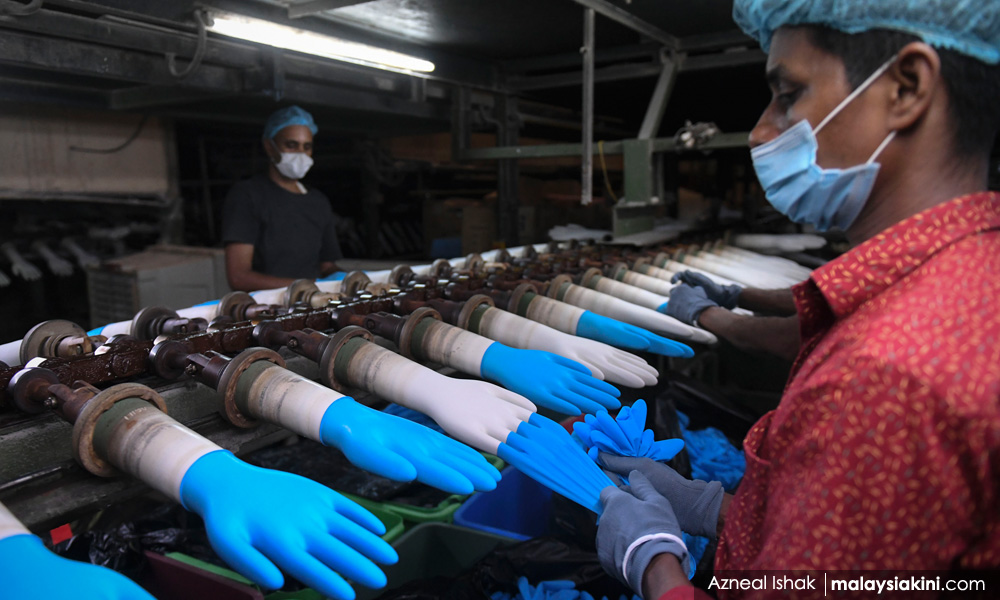It's not exactly all in a day’s work. When glove manufacturers are announcing their profits in the billions, it appears that the welfare of their workers who have helped generate the profits have been conveniently forgotten.
With news that the global supply of rubber gloves is projected to reach 420 billion pieces this year, and with 67 percent of that coming from Malaysia, manufacturers will be laughing all the way to the bank.
But why then the reluctance to comply with the laws? Yet again, glove manufacturers are seeking a reprieve from the Workers’ Minimum Standards of Housing and Amenities Act 1990 or Act 446.
Despite coming into force some nine months ago, the pleading, beseeching, and haggling continues. Yesterday, the Malaysian Rubber Glove Manufacturers Association (Margma) asked for “more time and space in managing housing and living standards for workers”.
Its president, Supramaniam Shanmugam, said overseeing the Act “was a tedious and cumbersome process”.
Acquiring or leasing a piece of land to build worker hostels on is not rocket science, and yet all kinds of excuses are being offered.
“Our members are working hard to deal with challenges such as building new housing, new hostels, ensuring neighbours do not complain, getting approvals from local authorities, and so forth,” Supramaniam told a media briefing yesterday.
Shouldn’t this have been done very much earlier? Why is everything done last minute? Weren’t the amendments passed two years ago? What did they do all this while?
The amendments, among others, mandate a minimum space requirement for workers’ accommodation, basic facilities, as well as safety and hygiene standards.
The provisions were implemented in June last year. After nine months, asking for more time makes a mockery of our system.
It should be noted also that in November last year, four major glove companies - Top Glove Corp Bhd, Hartalega Holdings Bhd, Supermax Corporation Bhd and Kossan Rubber Industries Bhd contributed RM400 million to help the government in its fight against Covid-19.

Unlike "Joe Public" who was given short notice to comply with the Prevention and Control of Infectious Diseases Act 1988 and the movement control order (MCO) which came into force last March, manufacturers have been given ample time.
Could we, like the glove manufacturers, have asked for time? The laws of the land apply to everyone and no one is exempted. Then, why is the Human Resources Ministry pussy-footing with the glove manufacturers?
Supramaniam was quoted as giving an assurance that manufacturers are willing to spend money to comply with the law but enough time has been given and they must be complied with pronto.
Ironically, while he was addressing the media, elsewhere, Human Resources Minister M Saravanan reminded employers that the government will not hesitate to take action against any company that fails to comply with the amendments under Act 446.
Words like "assurances", "reminders", and the phrase "will not hesitate to take action" have become over-used cliches and the only consolation we can take is that the media keeps the issue in the spotlight.
But Saravanan provided some respite: 59 employers will be hauled to court for various offences under Act 446.
The alleged offences include unsuitable living conditions, failure to provide separate units for women, failure to provide basic amenities like beds and mattresses, as well as not providing sufficient bathrooms.

Saravanan said most of the offenders were from factories making rubber gloves and furniture, among others.
The ministry had inspected 3,452 companies employing a total of 101,726 staff between Sept 1, 2020, and Jan 31 this year.
About 124 investigation papers had been opened, he said.
The Labour Department director-general now also has the power to immediately transfer employees from “overcrowded and uninhabitable” premises to temporary accommodation.
Under the emergency ordinance, Saravanan said, the ministry is empowered to instruct employers and those who provide lodging to replace and repair amenities that do not adhere to Act 446.
Failure to do so could see them slapped with an RM200,000 fine or a maximum jail term of three years, or both.
The minister also said 3,256 companies were inspected throughout the enforcement of Act 446 under the Emergency Ordinance.
“Eight investigation papers were opened and (these employers are) to be issued compounds.”
But whatever the quantum of the compound or fine, it is nothing to those who float in billions of ringgit.
If mandatory jail sentences for drink driving can be imposed even for first-time offenders, why can’t errant employers who treat their workers poorly be sent to jail?
R NADESWARAN says employers not only have to comply with the law but have a moral and ethical responsibility to their workers. Comments: citizen.nades22@gmail.com - Mkini
The views expressed here are those of the author/contributor and do not necessarily represent the views of MMKtT.




No comments:
Post a Comment
Note: Only a member of this blog may post a comment.